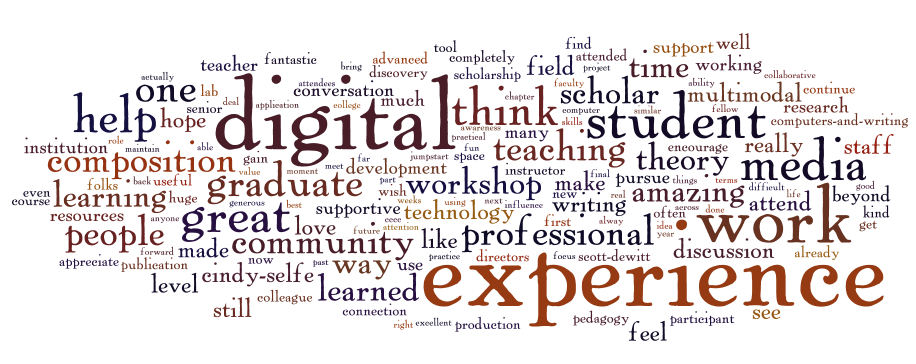analysis ii
The following word clouds show language trends in the responses to specific survey questions. Use the buttons below to navigate.
DMAC and CIWIC Director Cindy Selfe appears as the most common word string associated with how respondents reported that they learned about DMAC. Words indicative of personal and professional networks dominate the word cloud (for example: adviser and colleague). Interestingly, graduate students appear as the most implicated demographic, suggesting that younger scholars and teachers serve as the major driving force behind spreading the word about DMAC: a grassroots network rather than the top-down communication implicit in traditional understandings of professional development.
Language associated with email listservs represents another dominant means of learning about DMAC, and the WPA-Listserv in particular appears as the dominant email channel through which respondents reported learning about DMAC. The Institute advertises its open registration period through several email listservs: WPA-L, Wcenter, TechRhet, H-Rhetor, etc. Thus, the frequency of WPA-L citations suggests that researchers and teachers who learn about DMAC through an email listserv most likely come to the Institute with a scholarly agenda related to writing program administration.
Most common terms in descending order: cindy-selfe, graduate-student, attended, osu, colleague, professor, email, wpa-listserv, adviser, composition
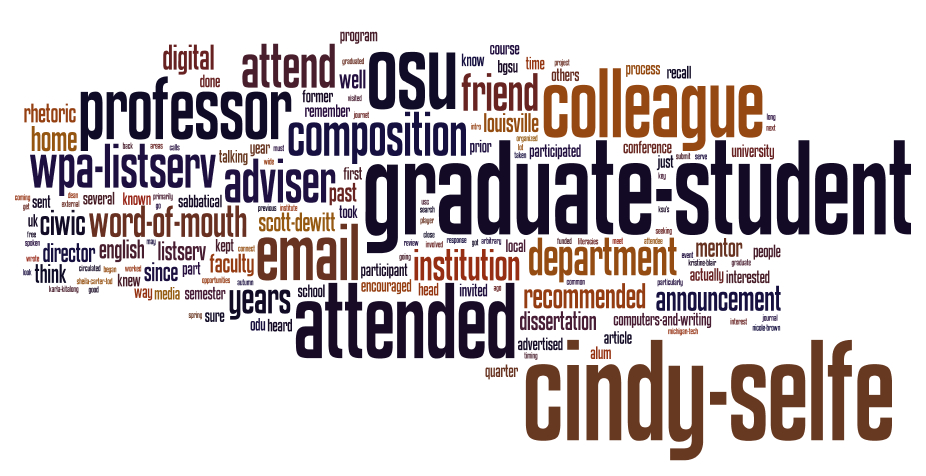
A note on methodology. The word clouds reveal the trends of concepts in respondents' language rather than trends of grammar. Using the editing options on the Wordle website, the word clouds render all lettering in the lower case and eliminate incidental words (for example, the and in). If an irrelevant word remained after this filter, it was eliminated manually (for example, also and DMAC). Words repeating the language of the question to which they respond also were eliminated (for example, goal and goals were eliminated from the responses to the question regarding participants' motives and goals for attending DMAC).
Word strings that cannot or ought not to be separated were linked with a hyphen so that the word cloud generator would treat them as a single word (for example, graduate-student and scott-dewitt). Forms of the same word or word string were combined into one (for example, Cindy, Cynthia Selfe, Cindy Selfe, and Dr. Selfe all became cindy-selfe, while Ohio State, Ohio State University, The Ohio State University, and OSU all became osu). When multiple forms of a word were present in the responses, singular forms of nouns replaced plural forms, and noun forms replaced adjectival forms (for example, pedagogical became pedagogy). However, in some cases different forms were retained if they carried significant differences in meaning (for example, technology and technological remain separate in the second word cloud because respondents used the former term to designate an abstract concept and the latter term to describe physical hardware and infrastructure).
Perhaps predictably, the most common words in responses to this question point to the subject matter of DMAC: digital and multimodal composition, writing, teaching, and technology. Learn and teach appear to be the most common verbs, while the rest of the larger words in the cloud function as either nouns or adjectives. Just as significant as what is said, however, is what is not said. While the word cloud suggests that responses almost exclusively concern DMAC's subject matter and its transmission (learning and teaching), we have to search carefully for language indicating the deployment and reevaluation of professional development—technology-driven or otherwise—in academic environments (for example, professional and community). As a crude distinction, then, respondents' motives for attending DMAC privilege content over form.
Most common terms in descending order: digital, composition, learn, teach, multimodal, media, writing, technology, class, research
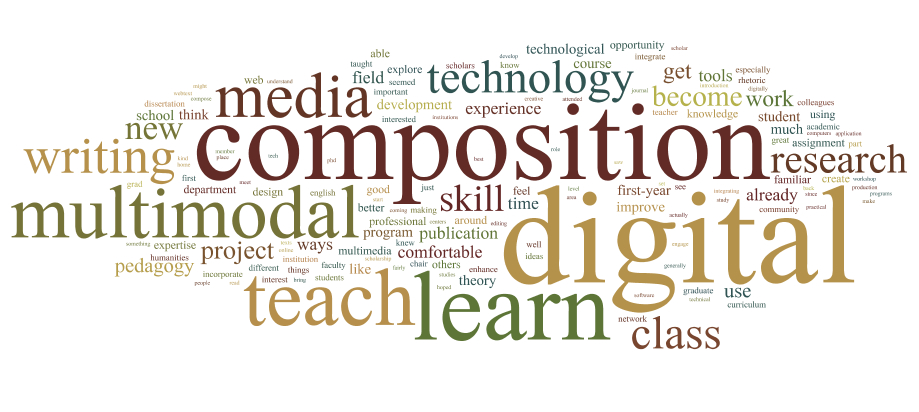
The responses for this question were particularly problematic because the language remained consistent across individual responses regardless of content. That is, whether respondents reported full, partial, or no financial or professional support, they used the same or similar words and word-strings. For the word cloud, paid replaced all language indicating that the respondent had to take on an expense personally, while funded, support, grant, and received, and covered indicate some kind of financial support.
Words indicating either partial or full financial support occur in much more abundance than terms indicating a lack of financial support, and words indicating professional or personal support occur in less abundance than terms indicating financial support. For example, support often designates remuneration or funding and occurs more frequently than supportive, which respondents used to describe a holistic or interpersonal condition including but not limited to money.
Most common terms in descending order: support, funded, received, grant, professional, institution, paid, department, cost, funding
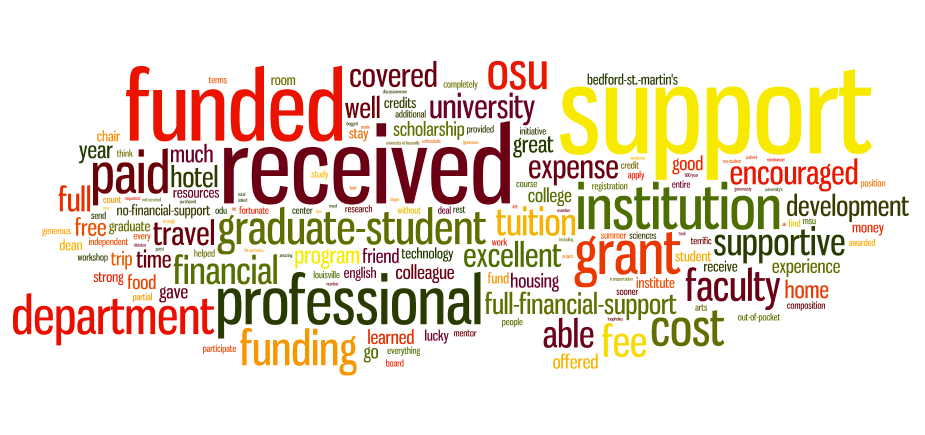
Like in participants' reported motives for attending DMAC, the reported results of attendance prominently feature the content of DMAC—digital and multimodal composition—in the context of teaching and research. However, the word cloud also prominently features language of action, especially as it relates to the implementation of technology-driven professional development at respondents' home institutions.
Most common terms in descending order: digital, course, composition, writing, media, multimodal, assignment, workshop, work, faculty
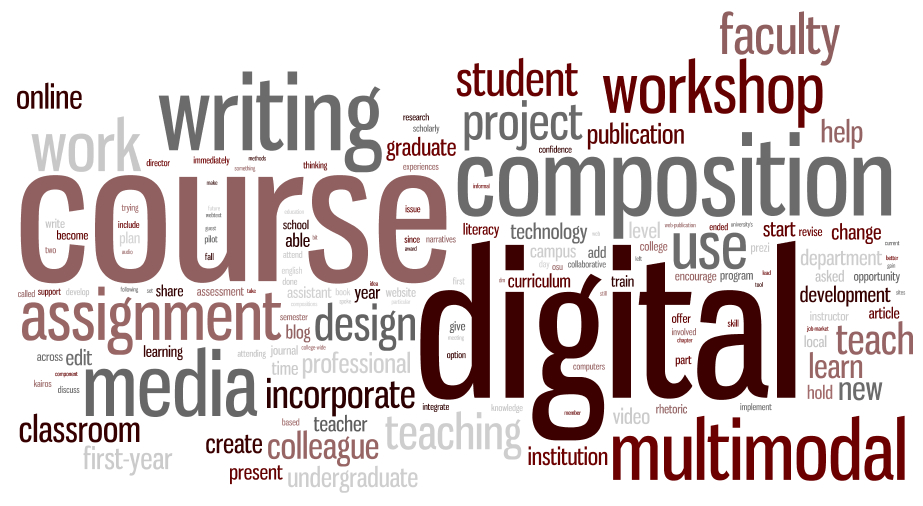
Respondents often described the networking opportunities of DMAC in terms of accessing other networks in the disciplinary areas of computers and writing, digital media studies, and rhetoric and composition (for example, conferences, publications, and programs). Language ranging from the personal to the professional characterizes respondents' networking experiences. The frequency of word use exhibits a more limited range than in other word clouds; thus, no one term or set of terms emerges unequivocally as the most common language.
Most common terms in descending order: meet, conference, people, several, osu, colleague, work, project, friend, participant
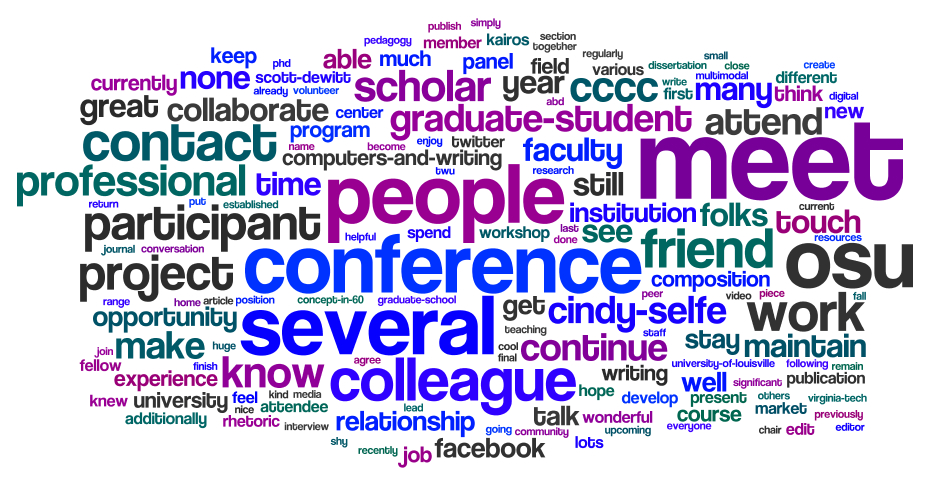
Because of the miscellaneous nature of the question, word usage in these responses varied widely. Different forms were retained in many cases because context and connotation also differed. Moreover, words that otherwise would have been eliminated were retained because they carried enough meaning in the context of the question at hand (for example, really and well). Respondents most often described DMAC as an experience (or in terms of their experiences at DMAC), while workshop also enjoyed a somewhat common usage. The question did not ask respondents to evaluate DMAC, but the language of evaluation appears frequently in responses. While respondents used the previous two questions to indicate specific results of attending DMAC, they used this question to indicate general and affective understandings of DMAC's influence.
Most common terms in descending order: digital, experience, work, student, help, media, think, great, professional, composition
